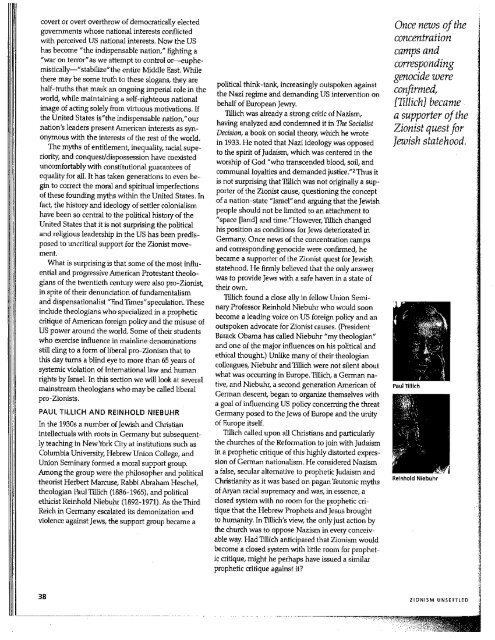zionism_unsettled_scan
zionism_unsettled_scan
zionism_unsettled_scan
You also want an ePaper? Increase the reach of your titles
YUMPU automatically turns print PDFs into web optimized ePapers that Google loves.
covert or overt overthrow of democratically elected<br />
governments whose national interests conflicted<br />
with perceived US national interests. Now the US<br />
has become "the indispensable nation," fighting a<br />
"war on terror" as we attempt to control or----euphemistically-"stabilize"the<br />
entire Middle East. While<br />
there may be some truth to these slogans, they are<br />
half-truths that mask an ongoing imperial role in the<br />
world, while malntalning a self-righteous national<br />
image of acting solely from virtuous motivations. If<br />
the United States is"the indispensable nation,"our<br />
nation's leaders present American interests as synonymous<br />
with the interests of the rest of the world.<br />
The myths of entitlement, inequality, racial superiority,<br />
and conquest/dispossession have coexisted<br />
uncomfortably with constitutional guarantees of<br />
equality for all. It has taken generations to even begin<br />
to correct the moral and spiritual imperfections<br />
of these founding myths within the United States. In<br />
fact, the histo!}' and ideology of settler colonialism<br />
have been so central to the political histo!}, of the<br />
United States that it is not surprising the political<br />
and religious leadership in the US has been predisposed<br />
to uncritical support for the Zionist movement.<br />
What is surprising is that some of the most influential<br />
and progressive American Protestant theologians<br />
of the twentieth century were also pro-Zionist,<br />
in spite of their denunciation of fundamentalism<br />
and dispensationalist "End Times" speculation. These<br />
include theologians who specialized in a prophetic<br />
critique of American foreign policy and the misuse of<br />
US power around the world. Some of their students<br />
who exercise influence in mainline denominations<br />
. still cling to a form of liberal pro-Zionism that to<br />
this day turns a blind eye to more than 65 years of<br />
systemic violation of International law and human<br />
rights by Israel. In this section we will look at several<br />
mainstream theologians who may be called liberal<br />
pro-Zionists.<br />
PAUL TlllICH AND REINHOLD NIEBUHR<br />
In the 1930s a number of Jewish and Christian<br />
intellectuals with roots in Germany but subsequently<br />
teaching in New York City at institutions such as<br />
Columbia University, Hebrew Union College, and<br />
Union Seminary formed a moral support group.<br />
Among the group were the philosopher and political<br />
theorist Herbert Marcuse, Rabbi Abraham Heschel,<br />
theologian Paul Tillich (1886-1965), and political<br />
ethicist Reinhold Niebuhr (1892-1971). As the Third<br />
Reich in Germany escalated its demonization and<br />
violence against Jews, the support group became a<br />
political think-tank, increasingly outspoken against<br />
the Nazi regime and demanding US intervention on<br />
behalf of European JeWl}'.<br />
Tillich was already a strong critic of Nazism,<br />
having analyzed and condemned it in The Sodalist<br />
Decision, a book on social theory, which he wrote<br />
in 1933. He noted that Nazi ideology was opposed<br />
to the spirit of Judaism, which was centered in the<br />
worship of God "who transcended blood, soil, and<br />
communal loyalties and demanded justice."2 Thus it<br />
is not surprising that Tillich was not originally a supporter<br />
of the Zionist cause, questioning the concept<br />
of a nation-state "Israel" and arguing thatthe Jewish<br />
people should not be limited to an attachment to<br />
"space [land] and time."However, Tillich changed<br />
his position as conditions for Jews deteriorated in<br />
Germany. Once news of the concentration camps<br />
and corresponding genocide were confirmed, he<br />
became a supporter of the Zionist quest for Jewish<br />
statehood. He firmly believed that the only answer<br />
was to provide Jews with a safe haven in a state of<br />
their own.<br />
mlich found a close ally in fellow Union Seminary<br />
Professor Reinhold Niebuhr who would soon<br />
become a leading voice on US foreign policy and an<br />
outspoken advocate for Zionist causes. (President<br />
Barack Obarna has called Niebuhr "my theologian"<br />
and one of the major influences on his political and<br />
ethical thought.) Unlike many of their theologian<br />
colleagues, Niebuhr and Tillich were not silent about<br />
what was occwring in Europe. Tillich, a German native,<br />
and Niebuhr, a second generation American of<br />
German descent, began to organize themselves with<br />
a goal of influencing US policy concerning the threat<br />
Germany posed to the Jews of Europe and the unity<br />
of Europe itself.<br />
Tillich called upon all Christians and particularly<br />
the churches of the Reformation to join with Judaism<br />
in a prophetic critique of this highly distorted expression<br />
of German nationalism. He considered Nazism<br />
a false, secular alternative to prophetic Judaism and<br />
Christianity as it was based on pagan Teutonic myths<br />
of Aryan racial supremacy and was, in essence, a<br />
closed system with no room for the p'rophetic critique<br />
that the Hebrew Prophets and Jesus brought<br />
to humanity. In mlich's view, the only just action by<br />
the church was to oppose Nazism in every conceivable<br />
way. Had Tillich anticipated that Zionism would<br />
become a closed system with little room for prophetic<br />
critique, might he perhaps have issued a similar<br />
prophetic critique against it<br />
Once news of the<br />
concentration<br />
camps and<br />
corresponding<br />
genocide were<br />
confirmed,<br />
[Tillich) became<br />
a supporter of the<br />
Zionist quest for<br />
Jewish statehood.<br />
Paul TIllich<br />
Reinhold Niebuhr<br />
38<br />
ZIONISM UNSETTLED


